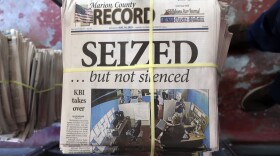The Marion County Sheriff’s Office agreed Thursday to destroy digital files it copied from computers seized during the raid on the Marion County Record.
Bernie Rhodes, an attorney for the newspaper, raised concerns about whether law enforcement had altered a list of evidence from the raid and illegally held onto a previously undisclosed flash drive containing the copied files. He said he had prepared a formal court order to ensure the sheriff’s office followed through with its promise to destroy any evidence that hasn’t already been returned, including photos taken during the raids.
Marion Police Chief Gideon Cody led the Aug. 11 raid on the newspaper office and the publisher’s home — under the pretense that reporter Phyllis Zorn had committed identity theft by looking up public information through the Kansas Department of Revenue website. The computers, cellphones, hard drives and other items seized during the raid were held at a storage locker at the sheriff’s office.
Rhodes said the police department has “zero forensic capabilities.” Because the sheriff’s office has limited capabilities, it acts as IT support for the police department, Rhodes said.
The sheriff’s office used software called OS Triage to conduct searches of keywords on the computers that were taken from the newsroom.
“They describe it to be nobody looked with meaningful eyes at anything,” Rhodes said. “This is simply the dump from the search generated by the use of the search terms.”
A Marion County undersheriff on Aug. 16, 2023, reaches into an evidence locker for items seized from the Marion County Record during an Aug. 11, 2023, raid by city police. (Sherman Smith/Kansas Reflector)
On Aug. 16, county attorney Joel Ensey declared there was insufficient evidence to justify the raids, and a judge ordered the materials to returned.
But the list of evidence that police provided to the newspaper when it handed items over to a forensic analyst conflicts with the list of evidence that police provided to the district court. One extra item, “OS Triage Digital DATA,” appears in the court filing.
Rhodes sent a letter Wednesday to attorney Bradley Jantz, who was hired to provide legal counsel for the county in the wake of the Aug. 11 raid. Jantz hadn’t responded to Rhodes’ inquiries about the evidence discrepancy.
“Because that drive is still in the sheriff’s office’s custody, that means the sheriff still has access to the Marion County Record’s data — data that is both constitutionally protected and protected by federal and state law,” Rhodes wrote in his letter. “This access is illegal. It also clearly violates the District Court’s August 16, 2023, Order.”
Jantz on Thursday directed Rhodes to talk to Ensey.
Rhodes said Ensey and the sheriff’s office agreed to provide him with a copy of the files they obtained with the OS Triage software, and then physically destroy the flash drive and a backup of the drive.
“In order to make sure that they actually comply with this order, unlike the last order, we’re making them agree to a formal court order,” Rhodes said in an interview.
Rhodes also said the sheriff’s office told him they didn’t share the copied files with the Kansas Bureau of Investigation, which is independently investigating whether someone breached the Kansas Criminal Justice Information System.
“We have not and will not examine anything from those warrants,” said Melissa Underwood, a spokeswoman for the KBI.
This story was originally published by the Kansas Reflector.
Copyright 2023 KCUR 89.3. To see more, visit KCUR 89.3. 9(MDA4OTAxNzAzMDEzMjc0MTc2MzA5ZDZlMw004))







